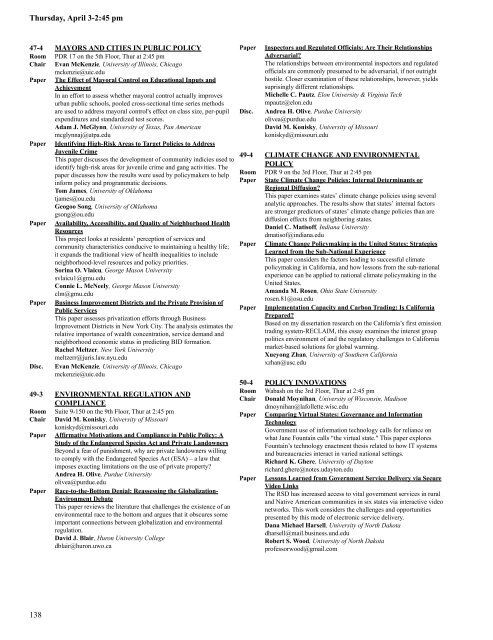2008 Conference Program - Midwest Political Science Association
2008 Conference Program - Midwest Political Science Association
2008 Conference Program - Midwest Political Science Association
You also want an ePaper? Increase the reach of your titles
YUMPU automatically turns print PDFs into web optimized ePapers that Google loves.
Thursday, April 3-2:45 pm<br />
47-4 MAYORS AND CITIES IN PUBLIC POLICY<br />
Room PDR 17 on the 5th Floor, Thur at 2:45 pm<br />
Chair Evan McKenzie, University of Illinois, Chicago<br />
mckenzie@uic.edu<br />
Paper The Effect of Mayoral Control on Educational Inputs and<br />
Achievement<br />
In an effort to assess whether mayoral control actually improves<br />
urban public schools, pooled cross-sectional time series methods<br />
are used to address mayoral control's effect on class size, per-pupil<br />
expenditures and standardized test scores.<br />
Adam J. McGlynn, University of Texas, Pan American<br />
mcglynnaj@utpa.edu<br />
Paper Identifying High-Risk Areas to Target Policies to Address<br />
Juvenile Crime<br />
This paper discusses the development of community indicies used to<br />
identify high-risk areas for juvenile crime and gang activities. The<br />
paper discusses how the results were used by policymakers to help<br />
inform policy and programmatic decisions.<br />
Tom James, University of Oklahoma<br />
tjames@ou.edu<br />
Geogoo Song, University of Oklahoma<br />
gsong@ou.edu<br />
Paper Availability, Accessibility, and Quality of Neighborhood Health<br />
Resources<br />
This project looks at residents’ perception of services and<br />
community characteristics conducive to maintaining a healthy life;<br />
it expands the traditional view of health inequalities to include<br />
neighborhood-level resources and policy priorities.<br />
Sorina O. Vlaicu, George Mason University<br />
svlaicu1@gmu.edu<br />
Connie L. McNeely, George Mason University<br />
clm@gmu.edu<br />
Paper Business Improvement Districts and the Private Provision of<br />
Public Services<br />
This paper assesses privatization efforts through Business<br />
Improvement Districts in New York City. The analysis estimates the<br />
relative importance of wealth concentration, service demand and<br />
neighborhood economic status in predicting BID formation.<br />
Rachel Meltzer, New York University<br />
meltzerr@juris.law.nyu.edu<br />
Disc. Evan McKenzie, University of Illinois, Chicago<br />
mckenzie@uic.edu<br />
49-3 ENVIRONMENTAL REGULATION AND<br />
COMPLIANCE<br />
Room Suite 9-150 on the 9th Floor, Thur at 2:45 pm<br />
Chair David M. Konisky, University of Missouri<br />
koniskyd@missouri.edu<br />
Paper Affirmative Motivations and Compliance in Public Policy: A<br />
Study of the Endangered Species Act and Private Landowners<br />
Beyond a fear of punishment, why are private landowners willing<br />
to comply with the Endangered Species Act (ESA) – a law that<br />
imposes exacting limitations on the use of private property<br />
Andrea H. Olive, Purdue University<br />
olivea@purdue.edu<br />
Paper Race-to-the-Bottom Denial: Reassessing the Globalization-<br />
Environment Debate<br />
This paper reviews the literature that challenges the existence of an<br />
environmental race to the bottom and argues that it obscures some<br />
important connections between globalization and environmental<br />
regulation.<br />
David J. Blair, Huron University College<br />
dblair@huron.uwo.ca<br />
Paper<br />
Disc.<br />
Inspectors and Regulated Officials: Are Their Relationships<br />
Adversarial<br />
The relationships between environmental inspectors and regulated<br />
officials are commonly presumed to be adversarial, if not outright<br />
hostile. Closer examination of these relationships, however, yields<br />
suprisingly different relationships.<br />
Michelle C. Pautz, Elon University & Virginia Tech<br />
mpautz@elon.edu<br />
Andrea H. Olive, Purdue University<br />
olivea@purdue.edu<br />
David M. Konisky, University of Missouri<br />
koniskyd@missouri.edu<br />
49-4 CLIMATE CHANGE AND ENVIRONMENTAL<br />
POLICY<br />
Room PDR 9 on the 3rd Floor, Thur at 2:45 pm<br />
Paper State Climate Change Policies: Internal Determinants or<br />
Regional Diffusion<br />
This paper examines states’ climate change policies using several<br />
analytic approaches. The results show that states’ internal factors<br />
are stronger predictors of states’ climate change policies than are<br />
diffusion effects from neighboring states.<br />
Daniel C. Matisoff, Indiana University<br />
dmatisof@indiana.edu<br />
Paper<br />
Paper<br />
Climate Change Policymaking in the United States: Strategies<br />
Learned from the Sub-National Experience<br />
This paper considers the factors leading to successful climate<br />
policymaking in California, and how lessons from the sub-national<br />
experience can be applied to national climate policymaking in the<br />
United States.<br />
Amanda M. Rosen, Ohio State University<br />
rosen.81@osu.edu<br />
Implementation Capacity and Carbon Trading: Is California<br />
Prepared<br />
Based on my dissertation research on the California’s first emission<br />
trading system-RECLAIM, this essay examines the interest group<br />
politics environment of and the regulatory challenges to California<br />
market-based solutions for global warming.<br />
Xueyong Zhan, University of Southern California<br />
xzhan@usc.edu<br />
50-4 POLICY INNOVATIONS<br />
Room Wabash on the 3rd Floor, Thur at 2:45 pm<br />
Chair Donald Moynihan, University of Wisconsin, Madison<br />
dmoynihan@lafollette.wisc.edu<br />
Paper Comparing Virtual States: Governance and Information<br />
Technology<br />
Government use of information technology calls for reliance on<br />
what Jane Fountain calls “the virtual state." This paper explores<br />
Fountain’s technology enactment thesis related to how IT systems<br />
and bureaucracies interact in varied national settings.<br />
Richard K. Ghere, University of Dayton<br />
richard.ghere@notes.udayton.edu<br />
Paper<br />
Lessons Learned from Government Service Delivery via Secure<br />
Video Links<br />
The RSD has increased access to vital government services in rural<br />
and Native American communities in six states via interactive video<br />
networks. This work considers the challenges and opportunities<br />
presented by this mode of electronic service delivery.<br />
Dana Michael Harsell, University of North Dakota<br />
dharsell@mail.business.und.edu<br />
Robert S. Wood, University of North Dakota<br />
professorwood@gmail.com<br />
138










